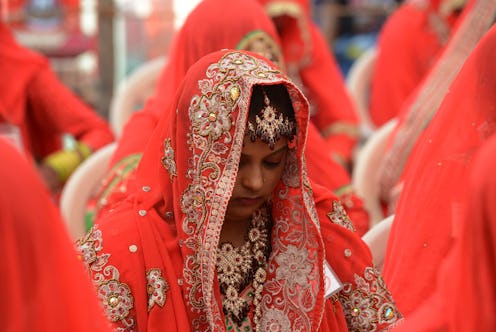Life
This Ruling In India Shows How Divorce Is Still A Feminist Issue

In October 2015, a Muslim woman named Shayara Bano from Uttarakhand, India, received a letter from her husband. The letter contained the Arabic word "talaq" written three times. With that letter, he was able to obtain a complete divorce and win custody of the couple's two children — legally. Known as "triple talaq," the practice of "instant divorce," as its known, was prevalent in certain Muslim communities, but it's been dealt a serious blow in India. The country's Supreme Court ruled yesterday that the practice is unconstitutional. The ruling is seen as a huge and historic win for women's rights in the subcontinent.
The ruling was the culmination of a fifteen-month court battle lead by Bano, who has a Masters degree in Sociology, and four other Muslim women in India who had experienced the sudden trauma and legal discrimination of triple talaq divorce by their husbands. One received a call from her husband in Dubai who merely said "talaq, talaq, talaq" and then disconnected; others received letters. Triple talaq has even been reported to take place via Whatsapp. The sixth petitioner was an organization called Bharatiya Muslim Mahila Andolan (BMMA), which submitted a petition called "Muslim Women's Quest For Equality."
Under Indian law, Muslims are governed by Muslim Personal Laws (the Islamic law code of Shariat) that are accepted within Indian legislation. The ruling makes triple talaq, a Muslim Personal Law, unconstitutional because it favors the legal authority of the husband (women are not allowed to practice triple talaq), and results in devastating legal consequences for the woman.
The Supreme Court ruled that it violated Article 14 of the constitution, which gives all Indian citizens, regardless of religion or gender, the right to equality. They argued, in a move that's been celebrated by women's rights activists across India, that triple talaq renders Indian women vulnerable to exploitation, and therefore should be made illegal.
Notably, however, the justices stated they were going to stay away from the question of whether "triple talaq" is a correct interpretation of Islamic strictures on marriage. Triple talaq is controversial, and it's far from universal among practicing Muslims worldwide; it is banned in 22 countries, including Pakistan and Bangladesh. But it does not, contrary to popular belief, have origins in the Quran. The BMMA argued in its petition to the Supreme Court that divorce in the Quran is only allowed after a compulsory 90 days in which reconciliation and arbitration can take place between the couple. The 90-day system is much more common among Muslims than immediate triple talaq. India is a crucial focal point for these and other debates about Islamic practice because the subcontinent is on track to have the world's biggest population of Muslims by 2050.
A survey by the BMMA in 2015 found that 1 in 11 Muslim Indian women had experienced instant divorce, and disadvantage for them exists across India. Muslim women in general are likely to be denied accommodation and face difficulties in employment; only 15 percent of all Muslim women in India are employed, largely because of cultural expectations about homemaking and discrimination in the job market. Al-Jazeera reported in 2013 that some Muslim women in India even pretend to be Hindu to find work. With this recent victory, Bano told the Hindustan Times, the situation might get better for Muslim Indian women. "My 11-year-old daughter will not have to face such regressive practices when she grows up. No Muslim women will have to go through the harassment that I suffered," she said.
However, the Supreme Court ruling isn't all that it seems. Vice-Chancellor of NALSAR University of Law Faizan Mustafa, in an interview with Al-Jazeera, pointed out that it might not go far enough. "Court judgments do not bring about social reforms. Now the only thing is if a Muslim male does triple talaq and if the wife goes to the court, the court won't recognize the divorce. Now, will the girl go back?" The next step, legal scholars argue, is specific legislation to outlaw triple talaq and set out penalties for people who attempt it, but that might be a long way off.
And there's a wider issue of women's rights as they relate to divorce. Divorce in India remains a hugely stigmatized practice. A 2016 study of the India census found that only 0.11 percent of the entire population is divorced (in the US, by contrast, it's 0.32 percent). It also found, however, that 0.29 percent of couples were separated, reflecting a desire to stay away from the "d word" and the stigma it comes with. And, in bad news for women's rights, the study also showed that women tended to stay divorced, while men remarried — a signal that the stigma of being divorced "stays" with women in India in a way it doesn't with men. Secular divorce law in India is also not particularly helpful for women; wives are entitled to one-third of their ex-husband's salaries if they have custody of children, but in practice, women receive alimonies closer to 2-10 percent, according to a 2010 report in the New York Times. A proposed law that attempted to address the balance, give women more rights, and allow them to claim marital property in divorce settlements was shelved in 2016.
So triple talaq might be officially off the books, but it might not stop Muslim men across India from continuing to pull the legal and social rug out from under their partners. Even if the practice dies out, the alternatives for Muslim women in the divorce court are still not nearly good enough. This is definitely a win for women's rights in the region, but there is plenty of work yet to do.